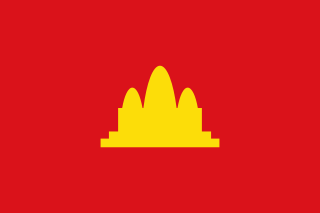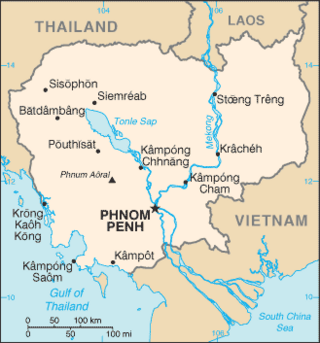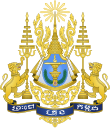
Pol Pot was a Cambodian communist revolutionary, politician and a dictator who ruled Cambodia as Prime Minister of Democratic Kampuchea between 1976 and 1979. Ideologically a Maoist and a Khmer ethnonationalist, he was a leading member of Cambodia's communist movement, the Khmer Rouge, from 1963 to 1997, and served as General Secretary of the Communist Party of Kampuchea from 1963 to 1981. His administration converted Cambodia into a one-party communist state and perpetrated the Cambodian genocide which killed nearly 25% of Cambodia's population.

Marshal Lon Nol was a Cambodian politician and general who served as Prime Minister of Cambodia twice, as well as serving repeatedly as defence minister and provincial governor. As a nationalist and conservative, he led the military coup of 1970 against Prince Norodom Sihanouk, abolished the monarchy, and established the short-lived Khmer Republic. Constitutionally a semi-presidential republic, Cambodia was de facto governed under a military dictatorship. He was the commander-in-chief of the Khmer National Armed Forces during the Cambodian Civil War. On April 1, 1975, 16 days before the Khmer Rouge captured Phnom Penh, Lon Nol fled to the United States, first to Hawaii and then to California, where he remained until his death in 1985.

Norodom Sihanouk was a member of the Cambodian royal house who led the country as King and Prime Minister. In Cambodia, he is known as Samdech Euv. During his lifetime, Cambodia was under various regimes, from French colonial rule, a Japanese puppet state (1945), an independent kingdom (1953–1970), a military republic (1970–1975), the Khmer Rouge regime (1975–1979), a Vietnamese-backed communist regime (1979–1989), a transitional communist regime (1989–1993) to eventually another kingdom.

The Khmer Republic was a Cambodian state under the United States-backed military dictatorship of Marshal Lon Nol from 1970 to 1975. Its establishment was formally declared on 9 October 1970, following the 18 March 1970 coup d'état which saw the overthrow of Norodom Sihanouk's government and the abolishment of the Cambodian monarchy.

The French protectorate of Cambodia refers to the Kingdom of Cambodia when it was a French protectorate within French Indochina, a collection of Southeast Asian protectorates within the French colonial empire. The protectorate was established in 1863 when the Cambodian King Norodom requested the establishment of a French protectorate over his country, meanwhile Siam renounced suzerainty over Cambodia and officially recognised the French protectorate on Cambodia.

The Kingdom of Cambodia, also known as the First Kingdom of Cambodia, and commonly referred to as the Sangkum period, refers to Norodom Sihanouk's first administration of Cambodia from 1953 to 1970, an especially significant time in the country's history. Sihanouk continues to be one of the most controversial figures in Southeast Asia's turbulent and often tragic postwar history. From 1955 until 1970, Sihanouk's Sangkum was the sole legal party in Cambodia.

The Cambodian Civil War was a civil war in Cambodia fought between the forces of the Communist Party of Kampuchea against the government forces of the Kingdom of Cambodia and, after October 1970, the Khmer Republic, which had succeeded the kingdom.
Hou Yuon (Khmer: ហ៊ូ យន់, 1930 – August 1975 was a veteran of the communist movement in Cambodia. A member of the Communist Party of Kampuchea, also known as the Khmer Rouge, he served in several ministerial posts during the 1960s and 1970s.

Khieu Samphan is a Cambodian former communist politician and economist who was the chairman of the state presidium of Democratic Kampuchea (Cambodia) from 1976 until 1979. As such, he served as Cambodia's head of state and was one of the most powerful officials in the Khmer Rouge movement, although Pol Pot remained the General Secretary in the party.

Sisowath Sirik Matak was a Cambodian politician and member of the Cambodian royal family, under the House of Sisowath.
The 1970 Cambodian coup d'état was the removal of the Cambodian Chief of State, Prince Norodom Sihanouk, after a vote in the National Assembly on 18 March 1970. Emergency powers were subsequently invoked by the Prime Minister Lon Nol, who became effective head of state, and led ultimately to the removal of Queen Sisowath Kossamak and the proclamation of the Khmer Republic later that year. It is generally seen as a turning point in the Cambodian Civil War. No longer a monarchy, Cambodia was semi-officially called "État du Cambodge" in the intervening six months after the coup, until the republic was proclaimed.

The Coalition Government of Democratic Kampuchea, renamed in 1990 to the National Government of Cambodia, was a coalition government in exile composed of three Cambodian political factions, namely Prince Norodom Sihanouk's FUNCINPEC party, the Party of Democratic Kampuchea and the Khmer People's National Liberation Front (KPNLF) formed in 1982, broadening the de facto deposed Democratic Kampuchea regime. For most of its existence, it was the internationally recognized government of Cambodia.

Operation Menu was a covert United States Strategic Air Command (SAC) tactical bombing campaign conducted in eastern Cambodia from 18 March 1969 to 26 May 1970 as part of both the Vietnam War and the Cambodian Civil War. The targets of these attacks were sanctuaries and base areas of the People's Army of Vietnam and forces of the Viet Cong (VC), which used them for resupply, training, and resting between campaigns across the border in the Republic of Vietnam. The impact of the bombing campaign on the Khmer Rouge guerrillas, the PAVN, and Cambodian civilians in the bombed areas is disputed by historians.

The Sihanouk Trail was a logistical supply system in Cambodia used by the People's Army of Vietnam (PAVN) and its Viet Cong (VC) guerillas during the Vietnam War (1960–1975). Between 1966 and 1970, this system operated in the same manner and served the same purposes as the much better known Ho Chi Minh trail which ran through the southeastern portion of the Kingdom of Laos. The name is of American derivation, since the North Vietnamese considered the system integral to the supply route mentioned above. U.S. attempts to interdict this system began in 1969.

Hu Nim, alias "Phoas" (ភាស់), was a Cambodian Communist intellectual and politician who held a number of ministerial posts. His long political career included spells with the Sangkum regime of Prince Norodom Sihanouk, the Communist guerrilla resistance, the GRUNK coalition government-in-exile, and the administration of Democratic Kampuchea, when the country was controlled by the Communist Party of Kampuchea.

Norodom Monineath Sihanouk is the Queen Mother of Cambodia. She was Queen of Cambodia from 1993 to 2004, as the wife of King Norodom Sihanouk. She is the widow of King-Father Norodom Sihanouk, whom she married in 1955 as the "secondary consort". After Sihanouk and Norleak divorced in 1968, Monineath became the official spouse of the King.
The Sangkum Reastr Niyum, usually translated as Popular (or People's) Socialist Community and commonly known simply as the Sangkum, was a political organisation set up on 22 March 1955 by Prince Norodom Sihanouk of Cambodia. Though it described itself as a 'movement' rather than a political party, the Sangkum retained control of the government of Cambodia throughout the first administration of Sihanouk, from 1955 to 1970. Central to the Sangkum ideology were nationalism, conservatism, preserving the monarchy, and a conservative interpretation of Buddhism.

Preah Sihanouk, also Sihanoukville, is a province (khaet) in southwest Cambodia on the Gulf of Thailand. The provincial capital, also called Sihanoukville, is a deep water port city and a steadily growing and diversifying urban center on an elevated peninsula.
Hang Thun Hak was a Cambodian radical politician, academic and playwright.

The Communist Party of Kampuchea (CPK), also known as the Khmer Communist Party, was a communist party in Cambodia. Its leader was Pol Pot, and its members were generally known as the Khmer Rouge. Originally founded in 1951, the party was split into pro-Chinese and pro-Soviet factions as a result of the Sino–Soviet split with the former being the Pol Pot faction, and the latter adopting a more revisionist approach to Marxism. As such, it claimed that 30 September 1960 was its founding date; it was named the Workers' Party of Kampuchea before it was renamed the Communist Party in 1966.
















